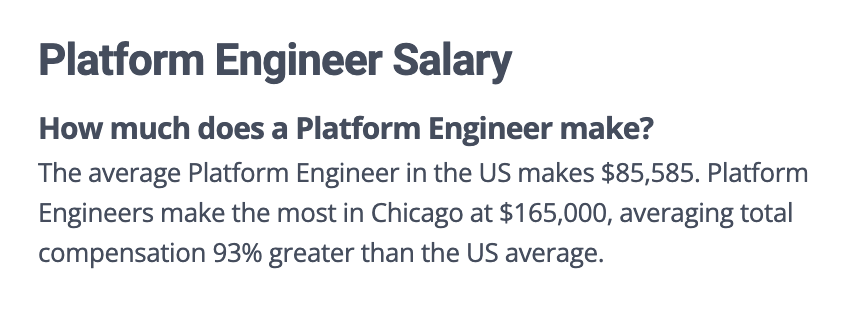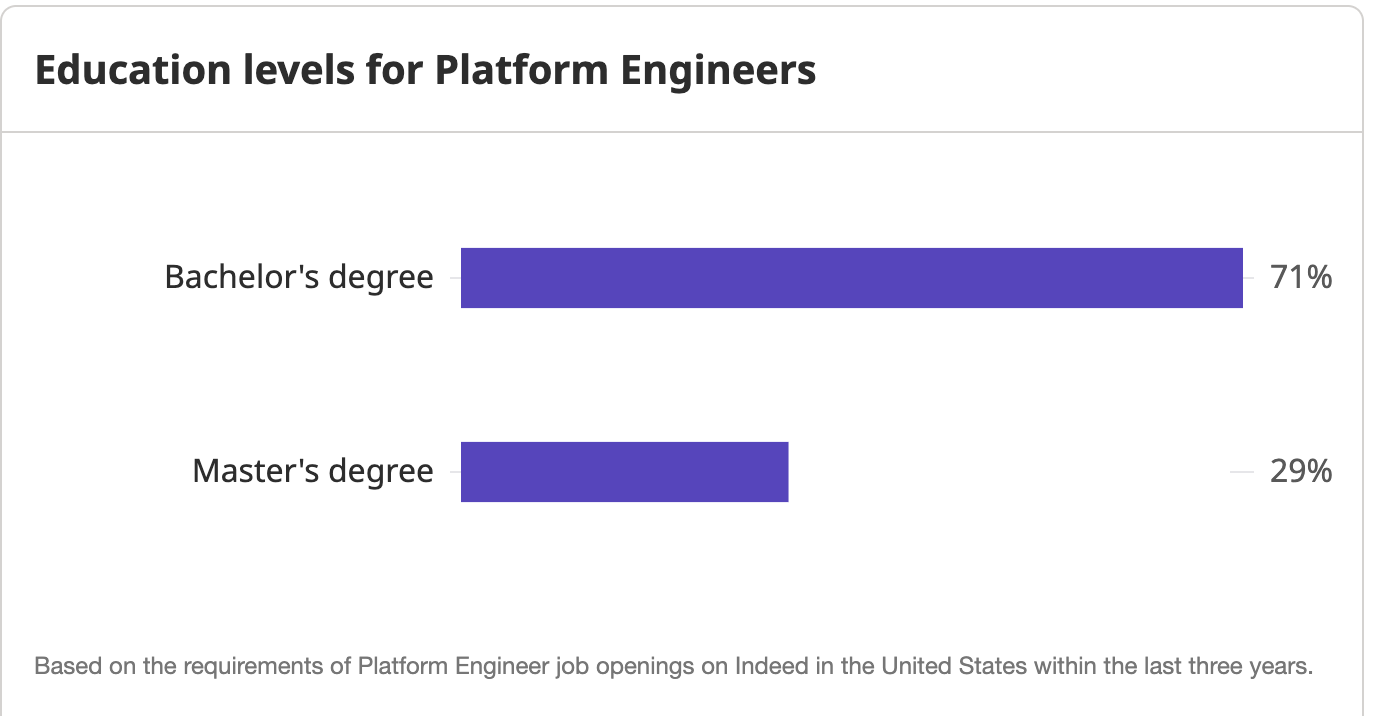How to Become a Platform Engineer

How to Become a Platform Engineer
A platform engineer is a great career to aspire to. The position is critical to the success of all tech companies and is projected to experience growth in demand over time. Those aiming to become platform engineers should thoroughly familiarize themselves with the needs of the role.
Updated April 18, 2023
According to the experts, now is a great time to get into platform engineering.
The U.S. Bureau of Labor Statistics estimates that the platform engineering job family will see a 22% increase in the number of available jobs from 2020 to 2030. This growth is well above the average expected increase for positions in other industries.
Before you jump toward platform engineering opportunities, though, it’s essential to develop a keen awareness of the expectations of the job, what it’s like to be part of a platform engineering team, as well as the required skills needed to complete tasks effectively in the role.
Learning more about platform engineering and its relation to your career goals will help you in your journey into the tech space - whether your focus is on software delivery or application development.
Hire a development company from the Manifest to get trusted developer experience.
Platform Engineer: Good to Know's
- What is a platform engineer?
- What does a platform engineer do?
- What is a platform engineer's salary?
- What skills does a platform engineer have?
What is a Platform Engineer?
Platform engineers function at the core of a company’s technological systems and workflows.
They need to become experts on the hardware, architecture, and operating systems that allow the company to provide their promised service and experience for customers. Frequently, they work with popular operating systems such as OS or Microsoft.
Experts note that platform engineers interface with infrastructure as code (IaC) solutions to handle configuration efforts. Some solutions that platform engineers may encounter include the following:
- Terraform
- AWS CloudFormation
- Chef
- Puppet
- Vagrant

Source: Software Engineering Daily
Each IaC has its assortment of pros and cons as well as specializations. For instance, Vagrant was created to enable people to build out development environments with agility.
Platform engineers should be familiar with these solutions to ensure the quality and workability of company platforms. From there, a platform engineer may leverage APIs and collaborate with app development teams or operations teams to implement company dev projects.
Platform engineers are essential to businesses because they exist at the core of the development process and maintain expertise in its technical infrastructure and programming language.
What Does a Platform Engineer Do?
A platform engineer’s role is to facilitate the connection between a company’s hardware and software.
In assuming a position as a platform engineer, you agree to maintain and uphold the tech systems and cloud platforms which the company uses to run. Some of the roles and responsibilities include the following:
- Manage and scripting database configuration and other configuration activities in an assortment of environments
- Oversee app packing processes to ensure that quality is upheld
- Assist with continuous integration, toolchains, cloud computing, and other tasks
- Ensure systems are secure via vulnerability scans and infrastructure backup updates
- Utilize a resource management platform and collaborate with the engineering team to locate optimization opportunities
- Offer capacity planning and maintenance to deepen the quality of the platform
- Handle automation deployment and continuous delivery processes
Platform engineers are responsible for maintaining the integrity of company infrastructure while working with other business arms to execute development projects and metrics. In short, they’re responsible for building a system that other development teams can use as a foundation or roadmap for their work.
Additional Reading: ‘5 States of an iOS App Lifecycle’
What is a Platform Engineer Salary?
Because of the varying levels of responsibility and wide range of tasks that could be assigned to a platform engineer, the general salary for the position ranges from about $20,000 to over $185,000.
Compensation for the role largely depends on your experience with new technologies and frameworks, education level, and the depth of knowledge required to handle the role successfully. However, in the United States, the average salary for a platform engineer is slightly higher than $85,000.

Further, the medium salary for platform engineers is $100,000. Aspiring platform engineers can expect to earn a figure within the ballpark of $100,000.
Salary for these roles will also depend heavily on the location where the work is being performed, so be sure to do some localized research on compensation for this role in your area before targeting your ideal salary range.
What Skills Do You Need to Be a Platform Engineer?
Platform engineers need a breadth of experience and technical skills to succeed in the industry. While the requirements of the job can be demanding, many platform engineers don’t have advanced degrees.

Rather than master’s degrees and PhDs, companies are looking for candidates with hard skills and experience to handle platform engineering responsibilities. Most platform engineers (65%) find themselves in a role after graduating with a Bachelor’s degree in a technical field and getting some experience with infrastructure and development under their belts.
While getting this experience both in and outside of the classroom, those who want to be platform engineers should focus on fostering proficiencies in at least a few of the following areas:
- AWS
- IaC
- Python
- Scala
- Big Data
- Docker
- Kubernetes
By focusing on some of these skills, you’ll be setting yourself up for success when it comes time to apply your knowledge to a platform engineering position. This way, you’ll find that you don’t need to learn as much on the job.
The roles and responsibilities will seem familiar to you, so you’ll have more time to focus on acclimating to company culture, pipelines, and processes.
Targeting the right skills development opportunities is key to becoming a platform engineer and successful in your first role as part of a product team.
Platform Engineers Require a Specific Skillset
Platform engineers are uniquely crucial to businesses because of their proximity to and understanding of technical infrastructure, software engineering, and configuration activity.
While some of their functions may appear similar to DevOps or even systems administration, platform engineers fill a distinct role in facilitating development within a company. Those hoping to become platform engineers should learn about the nuances of the position and the associated skills needed for positions with that job title to benefit companies and their end users.
